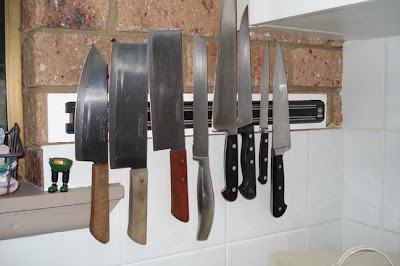One of the things that will make your work easier in the kitchen is to have a good set of knives. I use a variety of knives from good quality German chef's knives to cheap Chinese choppers. They are all used for their own purpose. Generally knives are expensive but they will last a long time if they're cared for properly.
Store your knives so the blade doesn't hit or rub against anything. I use a magnetic strip, but you could also use a knife block or a non-slip tray in a drawer that keeps knives apart.
Store your knives so the blade doesn't hit or rub against anything. I use a magnetic strip, but you could also use a knife block or a non-slip tray in a drawer that keeps knives apart.
All knives will eventually lose their edge and need to be sharpened. You can do that with a whetstone. While a whetstone will sharpen a knife, a steel will maintain the edge of your knife. Generally you'd sharpen a frequently used knife about once a month and use the steel when you use the knife. I'm a bit slack doing that. I do sharpen my knives each month but I usually forget to use the steel before I use the knife. There are instructions below for using a whetstone.
The heat and corrosive chemicals in the dishwasher will eventually damage the edge of most knives. You should hand wash your sharp knives. Wash in warm soapy water and dry thoroughly as soon as you wash the knife.
Don't let your knives soak in the sink or sit on a wet sink. Wash and dry them as soon as you can.
Don't use the knife edge to scrape food from your chopping board. It will damage and dull the edge. If you want to use the knife, turn it over and use the other side of the blade.
Use wood or poly cutting boards as marble, glass or ceramic boards will dull the knife edge.
Don't let your knives soak in the sink or sit on a wet sink. Wash and dry them as soon as you can.
Don't use the knife edge to scrape food from your chopping board. It will damage and dull the edge. If you want to use the knife, turn it over and use the other side of the blade.
Use wood or poly cutting boards as marble, glass or ceramic boards will dull the knife edge.
If you have wooden handled knives, apply some oil to the handle every so often. Make sure you don't allow these knives to soak in the sink or remain wet for long periods.
When you buy your knives, try to get good quality for your main work. As you can see from my knife strip above, I have some good knives and some very cheap ones. I use the cheap ones for chopping vegetables as I find a chopper easier to use. I need to sharpen these choppers more frequently as they tend to lose their edge quickly but they're a good knife for general work. If you can't afford to buy better quality right now, try the Asian choppers and knives. You buy them in Asian grocery stores and supermarkets for around $5 - $10. On the other hand, a good quality German or Japanese knife will cost around the $100 mark.
Whatever knives you work with, you will ensure their life and their usability if you look after them and keep them sharp.
Whatever knives you work with, you will ensure their life and their usability if you look after them and keep them sharp.













.jpeg)





.jpeg)
.jpeg)
.jpeg)
.jpeg)
4 Comments
Hi,
ReplyDeleteTHanks so mcuh for this post. I was doing everything wrong and didn't realize it. THanks for sharing.
Blessins',Lib
Hi Rhonda,
ReplyDeleteI confess, that I am on of those who puts her knives in the dishwasher. I have started to wash more by hand, so I will be making more of a conscious effort, to not put them where they can be damaged.
I was brought up with a steel in the home, as my father was a butcher.
Oooh, i just love my knives. I have found over the years that the Brazilian knives are just about as good as the german ones, and a bit cheaper.
ReplyDeleteAnother thing you shouldn't do with you knives, is stir the suff in saucepans, or check your vegies. Like the dishwasher, the heat affects the hardness. You don't put knives in the sink full of water, because you might accidently cut yourself, and don't ever try and catch a knife thats fallen of the bench.
I alsways take my own knife, if i am doing any volunteer food stuff, and always on holidays.
A good sharp knife makes such a HUGE difference to food preperation.
I know that it can be a bit superstitious, but I like to give good knives as gifts for 21st, weddings etc, because they are so very practical. to overcome the supperstision i always ask for a dollar, so i don't "cut the friendship"
Thanks for this post Rhonda. Jacky
Rhonda Jean, I love your blog! Please visit my blog to receive your Daily Dose award. :)
ReplyDeleteI welcome readers' comments. However, this blog never publishes business links or advertisements. If you're operating a business and want to leave your link here, I will delete your comment .